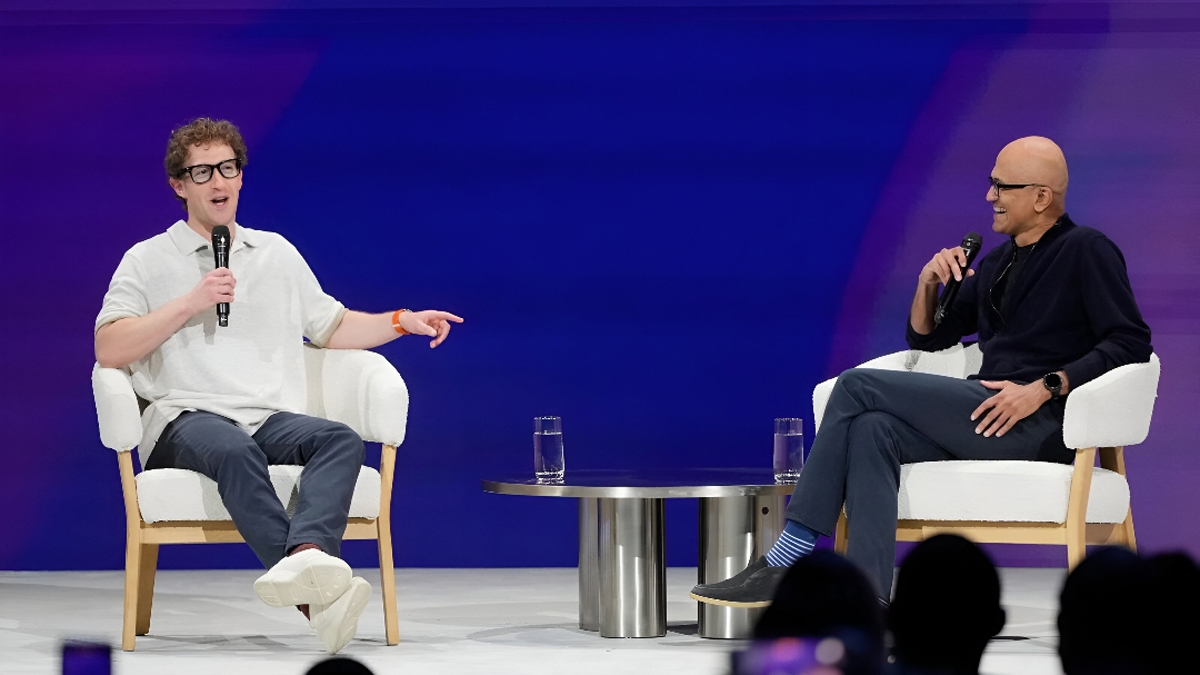Now Reading: Zuckerberg and Nadella Discuss the Future of AI at LlamaCon
-
01
Zuckerberg and Nadella Discuss the Future of AI at LlamaCon
Zuckerberg and Nadella Discuss the Future of AI at LlamaCon

In a significant convergence of tech leadership, Meta CEO Mark Zuckerberg and Microsoft CEO Satya Nadella engaged in a detailed discussion about the rapidly evolving landscape of artificial intelligence at Meta’s inaugural AI developer conference, LlamaCon, held in Menlo Park, California. The conversation centered on the accelerating pace of AI development and its profound impact on their respective organizations and the broader economy.
AI’s Role in Code Generation Takes Center Stage
A key highlight of the discussion was the increasing role of AI in software development. Nadella revealed that a substantial 20% to 30% of Microsoft’s code is now being generated by AI, with some projects being entirely written by machine learning models. Zuckerberg echoed this sentiment, projecting that within the next year, AI could be responsible for as much as half of Meta’s code development. This reflects a broader trend across the tech industry, with companies like Google also reporting significant percentages of AI-written code.
The two leaders also touched upon the evolution of AI from a mere productivity tool to a more autonomous agentic system. Zuckerberg envisioned a future where engineers would transition into more of a “tech lead” role, managing “an army of AI agents” that handle much of the coding work. Nadella emphasized the need for new metrics to evaluate AI’s success, focusing not just on productivity gains but also on its real-world impact, suggesting that AI should aim to increase the GDP of emerging economies significantly.
Meta Launches Standalone AI App
Adding another layer to the AI narrative, Meta unveiled its standalone AI application, powered by its Llama 4 AI system. This app is designed to compete with OpenAI’s ChatGPT and incorporates social media features, including a “discover” feed to showcase AI interactions and a voice mode for user engagement. By allowing users to link their Facebook and Instagram accounts, Meta aims to personalize the AI experience based on their social media context.
Open Source vs. Proprietary Approaches
Meta has adopted a distinct approach to AI development by releasing its models as open-source products, making them freely available. The company reports that over a billion people are already using its AI products monthly. This contrasts with the proprietary models developed by companies like OpenAI, in which Microsoft has a significant stake. Despite their different strategies, the dialogue between Zuckerberg and Nadella at LlamaCon underscores the mutual recognition of AI’s transformative power and the necessity for collaboration and discussion as this technology continues to reshape the industry.
Long-Term Implications and the Pace of Change
Both CEOs acknowledged the considerable “hype” surrounding AI but stressed the importance of seeing tangible increases in productivity reflected in GDP growth over the coming years. Nadella drew a parallel with the advent of electricity, noting that it took approximately 50 years for its impact to be fully realized in industrial processes. While Zuckerberg expressed hope that AI’s transformative timeline would be significantly shorter, both agreed that the integration of AI into the fabric of work and society would be a multi-year journey requiring both technological advancements and significant organizational and managerial adaptations.










